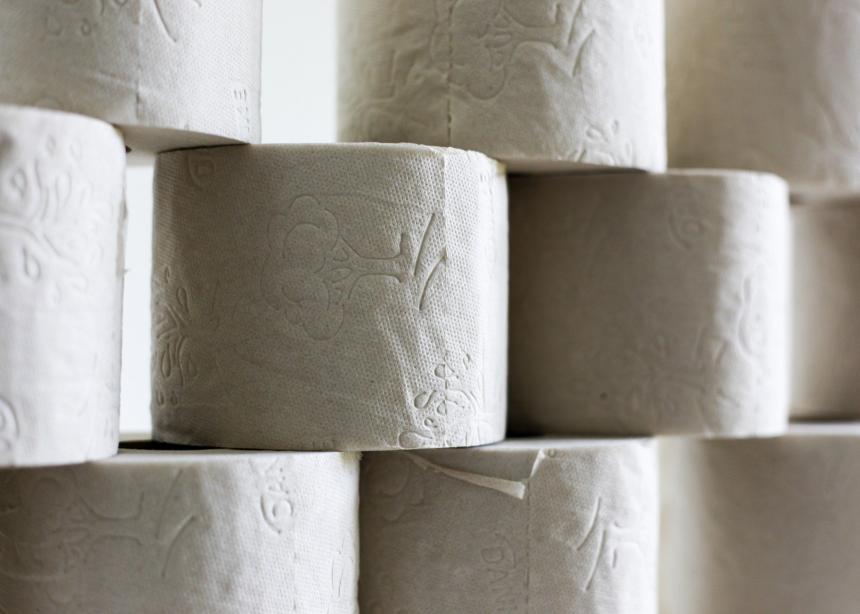I watched in disbelief as people feverishly filled their carts with toilet paper and bolted before someone could steal their treasure. In less than a minute, the toilet paper was gone and the mob dispersed. Except for one lady standing in front of a stack of six packages of toilet paper, protecting it from the envious eyes of those around her. She had “claimed” 180 rolls, approximately a year’s worth of toilet paper for her and her husband, who was making his way to her through the dissipating crowd with his cart.
The scene was so comically bizarre that I began laughing. This scowl-faced woman fiercely guarding her stash of toilet paper reminded me of Gollum in The Hobbit protecting his “precious.” My laughter eventually turned into judgment. A lot of other people needed toilet paper and had to go home empty-handed.
Then the Holy Spirit stopped me. Maybe she was purchasing it for a large group of seniors with health issues. It didn’t matter. Whatever her motive was, judgment belongs to God alone.
On my drive home, I realized that this incident was a microcosm of what happens on a much larger scale every day. There are people with millions, sometimes billions, of dollars, who protect their money stash as if their lives depended on it. They’re sitting on more money than they could reasonably spend, while people around them have none.
There are no easy solutions to wealth inequality, but it’s clearly unjust. It’s wrong. It’s ridiculous. It’s as bizarre as that lady protecting her loot of toilet paper.
Why do we hoard for ourselves at the expense of others? It’s fear. Underlying our greed and selfishness is the fear of “I don’t have enough.” Our deepest fear is “I’m not enough.”
Former U.S. president Franklin D. Roosevelt famously said, “The only thing we have to fear is fear itself.” What a profound truth. Fear makes us do things we wouldn’t normally do. People who are characteristically kind and gentle are capable of horrendous atrocities when overwhelmed by fear. Nothing takes us into a state of “false self” more than fear.
One of the primary things the risen Christ sets us free from is fear. Christ doesn’t set us free from hardship, suffering and death. Lots of good people suffer. Everyone dies eventually. What Christ sets us free from are the powers of sin, suffering, evil and death. And their primary power over us is fear.
About six months ago someone grieving the loss of a loved one told me, “People fear death like it’s the worst thing that can happen. But there are worse things than death.”
That really hit me. As I reflected further, I realized that he was right:
- To live in fear of death is worse than death.
- To live in fear of rejection is worse than rejection.
- To live in fear of failure is worse than failure.
- To live in fear of change is worse than change.
I John 4:18 says: “There is no fear in love, but perfect love casts out fear.”
Fear is a natural response to danger and the unknown, but when we discipline ourselves to stay in tune with the divine Spirit, we open ourselves up to God’s transformative love, which drives out fear. God’s love and fear cannot co-exist within our conscious experience of reality.
John continues: “If we are afraid . . . this shows we have not fully experienced God’s perfect love.” Fear is an alarm, reminding us to tune into the divine Spirit, to breathe and become aware of “God with us” and “God within us.” Fear demonstrates our need to intentionally and prayerfully open up our inner beings to God’s love. We can tell when we’re doing this because our fear fades.
Sometimes we need therapy, medication and other assistance to help us deal with fear and anxiety. But, for most of us, most of the time, an effective long-term solution to fear is a dedicated daily discipline of consciously tuning into divine presence and choosing to remember that “God is my shepherd, I don’t lack anything . . . even if I walk through the valley of the shadow of death, I have nothing to fear.”
Faith is daring to “fear not.” It’s the spiritual discipline of choosing to trust God regardless of how things appear. Faith is the practice of not being afraid. Even if all the worst-case scenarios happen, we won’t lose our joy, peace, hope, security, contentment and freedom. Not if we’re finding those things in God, first and foremost. That’s what true faith is.
Troy (troydw@gmail.com) is learning to “fear not.”
Related stories:
The church has left the building
Beautiful and terrible connections
Being the church in risky times
'Greater love has no one...'
An open letter to the younger generation during this time of COVID-19
Read more Life in the Postmodern Shift columns:
The snowball effect
Dwell in, not on
Paradoxical faith
Ten New Year's resolutions for an unexamined life
Unlearning 'Christianese'




Add new comment
Canadian Mennonite invites comments and encourages constructive discussion about our content. Actual full names (first and last) are required. Comments are moderated and may be edited. They will not appear online until approved and will be posted during business hours. Some comments may be reproduced in print.